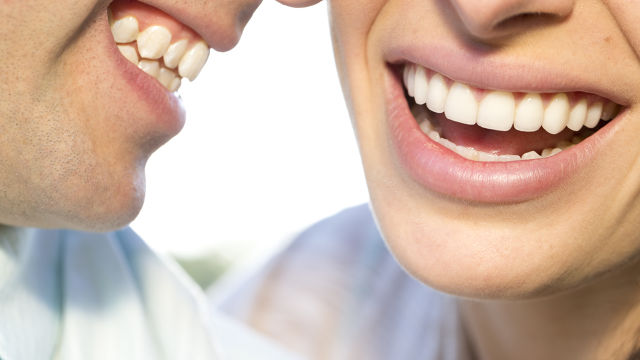-
-

BRUSHING & FLOSSING
How to BrushWhat Is the Right Way to Brush?
Proper brushing takes at least two minutes — that's right, 120 seconds!...

BRUSHING & FLOSSING
How To FlossWhat is the Right Way to Floss?
Proper flossing removes plaque and food particles in places where a toothbrush cannot easily reach... -
Science & Innovation
- Home
- Oral Health
- Bad Breath: Do You Have It?


Most people are unaware of the fact that they have bad breath, or “halitosis” as dental professionals refer to it.
Certain foods, health conditions and habits are among the causes of bad breath. In many cases, you can improve bad breath with proper dental hygiene.
If simple self-care techniques do not solve the problem, you may want to see your dentist or doctor to rule out a more serious condition that may be causing your bad breath.
Causes of bad breath
Bad breath can be caused by external and internal factors. External factors can be the types of food that we eat, such as those spicy or odorous in nature. If you think your bad breath is related to the foods you are consuming, consider recording the food you are eating to determine if this is the reason. People who use tobacco and alcohol can also experience bad breath.
The tongue provides a place for bacteria to attach and grow. Most odour-causing bacteria produce compounds called volatile sulphur compounds (VSCs), which cause bad breath. The primary VSCs that cause bad breath are hydrogen sulphide and methyl mercaptan. Most of these odour-causing bacteria reside in the posterior area of the tongue.
Other causes of bad breath can include the following:
- Dental issues – Poor oral hygiene, gingivitis and periodontal disease
- Dentures – Plaque and food can develop on dentures
- Dry mouth – Lack of saliva flow
- Mouth, nose and throat issues – Sinus or throat infections and cryptic tonsillitis
- Patients who are dieting on a regular basis.
Please see your dental professional for a dental appointment to determine why you are experiencing bad breath and continue to properly clean your mouth with antibacterial fluoride toothpaste, floss daily and clean your tongue with a tongue brush or scraper.
Related Articles

Acid reflux occurs when stomach acid moves into the oesophagus, leading to heartburn or regurgitation where sour or bitter acid backs up in the throat or mouth.

Bad breath can come from a number of places, but did you know you can get bad breath from stomach problems?

This article is intended to promote understanding of and knowledge about general oral health topics. It is not intended to be a substitute for professional advice, diagnosis or treatment. Always seek the advice of your dentist or other qualified healthcare provider with any questions you may have regarding a medical condition or treatment.
Related Products

Helping dental professionals
More professionals across the world trust Colgate. Find resources, products, and information to give your patients a healthier future








